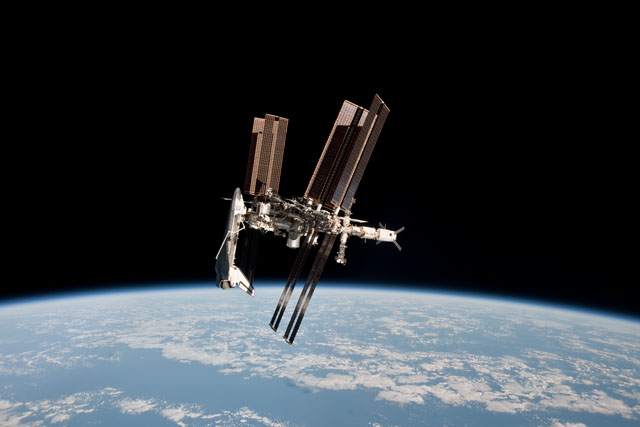This is a deeply bittersweet photo. Most of us have been waiting decades to see something like it. And very soon it will no longer be possible to see such a thing again. Next month, the space shuttle fleet will be retired after a 30-year career.
I stayed home from elementary school to watch the first launch of the shuttle Columbia on April 12, 1981. I got to see Columbia after its landing in White Sands, New Mexico following its third mission. I grew up with the shuttle. I remember the promises: that it was a “space truck;” that it would make space travel as cheap as regular freight; that it would launch the components for an eventual swarm of orbital facilities that would serve as hopping-off points to Lagrange colonies, lunar mining stations, asteroid prospecting expeditions, planetary missions, and oh so much more. The shuttle, in other words, was the vehicle that would usher in The Future.
So that photo actually got me choked up a little bit. It hit me like a snapshot from a parallel reality, or from the Future That Could Have Been. I had to get up, put on John Barry’s regal score for Moonraker, close my eyes, and go back in time 30 years to when all those things were all still exciting possibilities.
Now, I’m not going to blame presidents or politicians or bureaucrats for this or that decision. Robust, rugged, and reliable space travel is bogglingly complicated, and it’s mind-blowingly expensive. And it may not be the sort of thing that governments do well. Or entrepreneurial companies either, for that matter. See, governments aren’t in the vision business; they’re in the governing business. Companies aren’t in the vision business either; they’re in the return-on-investment business. We haven’t yet found the “sweet spot” that can enable us to pull off routine space travel, but then again I bet we haven’t even come close to exhausting the possibilities. So where will the solutions come from, and how will we know what they look like?
At Balticon, I got to meet and talk with Scratch Bacharach, who’s been a fan of science fiction for almost as long as I’ve been around and he’s still convinced that he’s not going to die on this planet. I haven’t met anyone who’s said anything like that for many, many years, and boy did it stir up some long-forgotten feelings. There is still such a thing as optimism.
I’m a writer for a living, but I have to admit that I didn’t know the etymology of the word “optimism.” So I went and looked it up, and I was pretty surprised by what I learned. The word dates from 1737; I guess I shouldn’t be surprised that it was coined during the Enlightenment. It was originally used to label a philosophy dedicated to achieving “the greatest good.” Optimum-ism, in other words — the Sisyphean effort to create the most good for the least evil. Originally a French word, it didn’t even enter English usage until a decade after the American Revolution.
Think about that for a second. Adams, Franklin, Washington et al. didn’t have the word “optimism” to describe their plan to invent a new nation based solely on the ideals of equality and inalienable rights.
Kind of puts space travel into perspective, doesn’t it?
Moving into space isn’t going to result in the creation of utopias (Greek for “nowhere lands”). It’s not going to solve all our earthly economic and environmental problems. We’re going to bring all that baggage with us wherever we go. Gerard K. O’Neill kicked off the Space Colony movement by arguing that the surface of the Earth wasn’t the best — the optimum — place for a technological civilization to expand to its fullest potential (or inevitable consequences, depending on your perspective). No one knows if he’s right. I don’t know if space travel is a biological imperative or just simple escapism, or even if it has to have a reason.
But thanks to my friend Scratch Bacharach, I am reminded that whatever ends up happening, it’ll be the optimists asking the tough questions, exploring the possibilities, trying things out, succeeding sometimes and failing often, getting up again and failing better the next time until they figure it out.
Turns out, optimists are pretty easy to spot after all.
They’re the ones looking up.
“Mama told me not to look into the eyes of the sun
But Mama, that’s where the fun is.”



Pingback: On Optimism and Optimists « Sotto Voce.